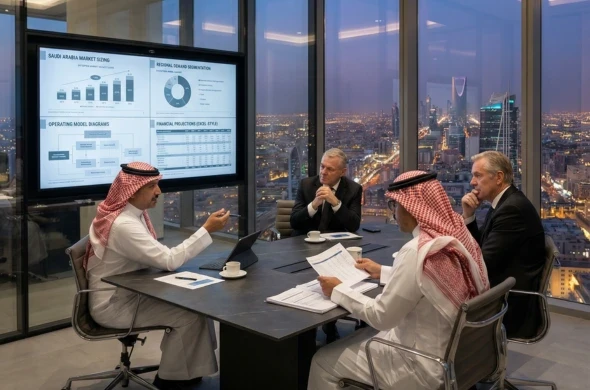Technology is fundamental for innovation, opening doors to progress and development. Thanks to technology, countries around the world are pushing the realm of what is possible.
In the Middle East, Saudi Arabia is leading the charge as an emerging tech hub and continues to invest in the future of digital transformation.
Saudi has developed a deep understanding of how to leverage digital transformation and magnify its impact. The country’s conscious effort to progress has contributed to them becoming a tech hub of the future - but what does that mean?
What Makes a Top Tech Innovation Hub?
A tech innovation hub involves a lot more than fast computers and electric cars. There are a few key factors that rank a destination as a thriving tech innovation hub, namely infrastructure, demographics, and university communities. Macro factors such as available funding and tax incentives are also major attractions.
Ultimately, a technology hub can be described as an urban area that attracts young professionals and creates a pipeline of skilled talent with access to modern infrastructure.
Cities such as Singapore, London, and Tel Aviv have earned the reputation for being functional tech hubs, playing a vital role in global development. Now, Saudi is showing the world what it can contribute as a locale.
Saudi Initiatives as a Top Tech Hub
Saudi Arabia continues to dominate as the largest Arab economy, with an impressive $804.9 billion gross domestic product (GDP). The country’s Vision 2030 objectives have placed technology at the heart of the nation’s plan as Saudi makes the shift from a dependency on oil to nurturing tech innovation and entrepreneurship.
In addition, Saudi boasts an impressive young and educated population, positioning the country to become the Silicon Valley of the Middle East. Of the population of 33 million, two-thirds are under the age of 35, which offers the opportunity for technology to embed itself in the nation’s progress.
Recently, the Kingdom of Saudi Arabia announced the biggest technological launch of its kind in the MENA region, with a total value of more than $1 billion (SAR 4 billion).
The Saudi embassy reports, “The move, done in cooperation with ten of the world's key technology giants, aims to enhance digital capabilities and is designed to create one programmer out of every 100 Saudi nationals by 2030, in addition to encouraging innovation and creativity and achieving global leadership.”
Another initiative includes the creation of the Saudi UK Tech Hub, an initiative that provides a space for startups to flourish. Fintech innovation, startups, and a knowledge-based economy are laying the groundwork for Saudi’s efforts at transformation.
Key events in the pipeline, set to cement Saudi as a tech hub, include the following;
- LEAP
- @Hack
- Tuwaiq 1000 Bootcamp
- Coderhub
- National Technology Development Program
- ICT Strategy 2023
Saudi Tech Innovations
While Saudi Arabia is taking a holistic approach towards technology, there are a few technologies that stand out as having a game-changing impact on the nation’s economic transformation:
- IoT and Connected Devices
- Artificial Intelligence (AI)
- Big Data Analytics
- 3D Printing
- Robotics and Drones
- Blockchain
- Non-Fungible Tokens (NFTs)
- Digital Currency
- Augmented Reality (AR) and Virtual Reality (VR)
- Cybersecurity
IoT and Connected Devices
Internet of Things (IoT) and connected devices are playing a pivotal role in Saudi’s development. Devices such as Smart TV, voice assistants, and connected security cameras are widely adopted across Saudi (with approximately 38% classified as extreme smart home adaptors).
Taking these devices one step further, Saudi hosts an annual Exhibition and Conference for Internet of Things at the Riyadh International Convention and Exhibition Center which strives to redefine communication. Dubbed as the region’s biggest technology event, the event features conference speakers, workshop sessions, panel discussions, and more.
Artificial Intelligence (AI)
Saudi has embraced AI in an effort to drive innovation and economic growth. AI plays a pivotal role in the nation’s bold reform program Vision 2030.
Dr. Ahmed Al Theneyan, Deputy Minister of Technology, Industry and Digital Capabilities, Saudi Arabia, shares, “I believe that AI and robotics have huge potential to improve our lives and boost productivity. We just need to employ them and use them in the right manner.”
AI presents an innovative, responsible and ethical way to meet the goals of the Vision 2030 program. The government has invested approximately $3 billion in building AI-friendly infrastructure with a special focus on education, health, and building smart cities.
Big Data Analytics
Saudi’s Big Data and AI market is expected to reach USD 892 million by 2026, registering a compound annual growth rate (CAGR) of 32.6% from 2021. Big Data will play a pivotal role in diversifying Saudi’s economy, moving it away from oil revenues.
Big Data is particularly prevalent in Saudi’s educational sectors, enhancing value realization for organizations. The digital focus has the power to gauge deeper insights for scientific decision-making processes by offering large and distributed data (both structured and unstructured). One of the most obvious ways is through the e-learning market which is expected to reach over USD 1 billion in terms of revenue by 2025.
3D Printing
3D printing has the power to increase time-to-market turnaround, save costs on tooling, and reduce waste. Although considered a new player in the field, Saudi is no stranger to leading progress with 3D printing, having built the first house using 3D printing technology in the Middle East.
Organizations within the nation recognize the value and potential of 3D printing. For example, Saudi Arabian construction company, Elite for Construction & Development, Co. recently purchased the world’s largest 3D construction printer.
Robotics and Drones
Saudi has put robotics at the center of its Saudi Green Initiative (SGI), transforming the country into a more clean and sustainable nation. According to Dr. Sidki, executive director at the Stanford Research Institute, “The SGI is a great initiative that can produce a clean future, reduce carbon emissions and impact climate change. AI and robotics can play a major role in this, not only here in Saudi Arabia but across the Gulf region.”
Technology helps by monitoring the health of crops and the planting ecosystem, including the use (and misuse) of water. Saudi has also become a global leader for emerging drone technologies, particularly heavy-lift drone technology to deliver important medical and consumer supplies to complicated terrain.
Blockchain
Blockchain is set to be the backbone of Saudi’s financial system and is poised to grow by 41% within three years. The nation was one of the first to experiment with blockchain technology-aided transfers and has since explored various avenues to advance the financial sector.
National bank computerized monetary standards (CBDCs) have increased Saudi’s reliance on blockchain technology, offering multiple benefits in the process.
Non-Fungible Tokens (NFTs)
NFTs have gripped the interest of investors around the world, blurring the lines between the physical and digital world. The window of opportunity is available to global artists, including those in Saudi Arabia.
Consider Arc, a local visual artist who was initially skeptical of crypto, started posting on Known Origin, a digital marketplace. Since, Arc has sold more than 270 pieces in the form of non-fungible tokens or NFTs, to a value of more than $480,000.
Digital Currency
Together with the UAE, Saudi has embraced the potential of digital currency and ramped up its efforts to attract cryptocurrencies. Consider how the Saudi Central Bank has been working to adopt blockchain and digital payments and position the nation as a safe harbor for crypto.
Even better, Saudi Arabia is creating a space for international parties to connect with the nation through crypto. For example, Saudi announced that the country will launch Ripple’s On-Demand Liquidity platform which should make international payments easier.
Augmented Reality (AR) and Virtual Reality (VR)
Across Saudi Arabia, brands are turning to AR and VR in an effort to stay relevant with their audience, which involves a high rate of smartphone adoption and a generation of “digital natives”.
A survey conducted among Saudi citizens revealed that 88% have used an AR feature in the past year. AR is especially prevalent in the tourism sector where an AR tool allows users to “visit” Saudi’s historical wonders through their smartphones (particularly through Snapchat). Overall, Saudi is considered to have an edge in AR technology.
Cybersecurity
When technological development is rushed, it introduces a security risk. Saudi is aware of the risks involved with becoming a smart city and is taking active measures to secure the nation against potential threats. Consider that the Saudi National Cybersecurity Authority will stage the Global Cybersecurity Forum in Riyadh in February 2022.
Individual entrepreneurs are also embracing cybersecurity. For example, Saudi entrepreneur Badar Othman Alabduljabbar has teamed up with Finnish tech investor TCG to complete a $2.4 billion growth funding round for digital transformation (with a strong focus on cybersecurity).
Saudi’s Top Technology Consulting Services
Ollen Group technology consulting services offer turnkey solutions from strategy to execution, as well as design, development, and deployment.
Read our latest insights, ideas, and perspectives that explore the trends shaping the future of business and society. Our consultancy services go hand-in-hand with these insights, confirming our position as industry leaders. Get in touch to find out more about our consulting services and industry expertise.



